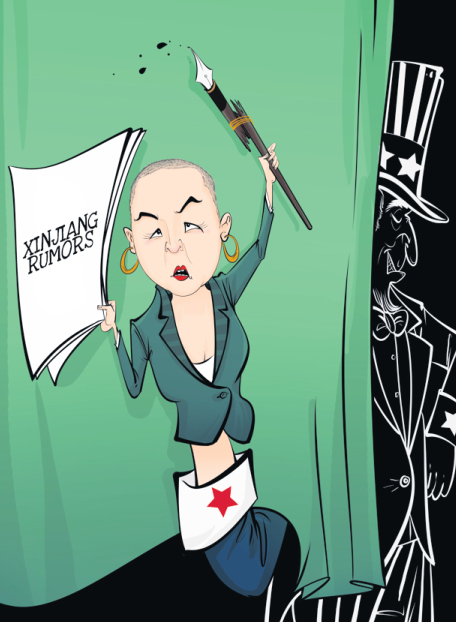The truth prevails


China's successful counterterrorism and de-radicalization measures in Xinjiang withstand the attempts to defame them
The Xinjiang-related issues that are making headlines in the West are not about human rights, nor are they about ethnicity or religious belief. They are simply lies fabricated by the United States with the purpose of sowing discord within China and alienating China from the rest of the international community.
"Things to Know About All the Lies on Xinjiang: How Have They Come About", a report released by China Watch Institute, reveals "an industrial chain" whose purpose is to hype up Xinjiang-related issues with the aim of containing, destabilizing and weakening China.
The Xinjiang Uygur autonomous region, like any other parts of China, has benefited a lot from the targeted poverty alleviation drive the country has implemented in recent years. The region has shaken off extreme poverty and the living standards of people of all ethnic groups have improved greatly. The region once again enjoys social stability and economic development thanks to the counterterrorism and de-radicalization measures introduced in recent years.
But manipulated by the US, Xinjiang-related issues have been cloaked in human rights, ethnic minority rights, freedom of religious belief and cultural diversity to cater to tastes of Western media outlets, academic communities and the public in order to mobilize anti-China forces. Yet it is absurd to say that the US cares about the human rights of Muslims as the last several decades have witnessed the US military forces trampling over human rights in Islamic countries such as Iraq, Afghanistan and Syria.
Xinjiang-related issues have been hyped up by organized forces with deliberate planning and cross-sector cooperation, demonstrating a top-down mechanism to manipulate Xinjiang-related issues. Any incidents that are worth sensationalizing are hyped up by some pet think tanks and media outlets. Anti-China forces in the US Congress will later submit bills to legalize sanction, then anti-China proposals are submitted in international organizations such as the United Nations Human Rights Council to internationalize Xinjiang-related issues and counter China.
First, "facts" are fabricated for speculation. According to the China Watch Institute report, most figures and events in the cases that allegedly show disappearances and deaths of people in Xinjiang are completely inconsistent with the facts. Nonetheless, these cases which are mostly fabricated by the core persons of the World Uyghur Congress and a cohort of Xinjiang separatists living overseas are repeatedly cited by Western media and human rights organizations. Many online videos showing "violation of human rights in Xinjiang" actually present scenes in Bosnia and Herzegovina, Iraq and Syria. The Chinese government's poverty-reduction efforts of providing free vocational training and introducing jobs for migrant workers in Xinjiang-which is actually common in other provinces-are also distorted as "forced labor" practices.
These "facts" are then sensationalized by US media outlets. Radio Free Asia, a US government-funded news agency, has employed a group of Xinjiang separatists who are also employed by US intelligence agencies to spread rumors and create trouble. Some Western media outlets that pride themselves on their professionalism have produced reports based on the presumption that China is guilty of the allegations of these troublemakers. Some Western reporters who have claimed to have conducted impartial "interviews" in Xinjiang have spread their unsubstantiated eye-catching reports on social media platforms in order to attract eyeballs and manipulate public opinion.
The academic community has also been involved. In recent years, seminars on Xinjiang-related issues and research reports have increased substantially, with academic papers published by scholars who have never been to Xinjiang.
Adrian Zenz is one of them. He is touted as a Xinjiang expert by the US government and some media, but he has never been to Xinjiang and his papers are full of fallacies that are against common sense and academic norms. The source of his data is just Radio Free Asia.
The Australian Strategic Policy Institute is to be blamed for hyping up the alleged "forced labor" in Xinjiang first. Most of the information and data in its research reports are cited from other papers full of speculation and inferences, of which the main authors are anti-China extremists.
Once the issues are stirred up, politicians will take up the baton. Anti-China members of the US Congress have used topics such as "forced labor" and "monitoring and privacy invasion" to impose sanctions on China. Since 2019, some members of Congress have been attempting to develop a system of on-target sanctions through special bills under the Uyghur Human Rights Policy Act upper-level legislation. With these bills, the US government is able to apply sanctions for various purposes including undermining China's supply chain and weakening its technological and industrial advantages.
For a long time, terrorism and extremism have posed great threats to social stability and economic development in Xinjiang. To cope with the challenges, the Chinese government has focused on boosting economic growth and targeted poverty alleviation and launched de-radicalization measures in the region, making notable achievements. Xinjiang has seen no violent or terrorism incidents for nearly four years. De-radicalization measures centering on vocational training and standard Chinese teaching have been launched to help local ethnic minorities get more employment opportunities, which is expected to fundamentally eliminate extremism and ensure long-term stability and people's wellbeing.
In recent years, the per capita income in Xinjiang has grown by more than 8 percent year-on-year, much higher than the country's average. By the end of 2020, the last 10 impoverished counties in Xinjiang shook off poverty. In 2019, the region welcomed more than 210 million tourists from home and abroad, a sharp increase of 42 percent year-on-year. With religious freedom, it now has more than 24,000 mosques, meaning that there is one mosque for every 530 Muslims.
While terrorism is the common enemy of humankind, de-radicalization is our common cause. Some countries such as the US have politicized Xinjiang-related issues and spread rumors to contain China, even not hesitating to undermine the global anti-terrorism and de-radicalization efforts. However, the plot of smearing China on Xinjiang-related issues to contain its development is bound to fail.
The author is a professor with the Institute of Middle East Studies, Shanghai International Studies University. The author contributed this article to China Watch, a think tank powered by China Daily. The views do not necessarily reflect those of China Daily.


































